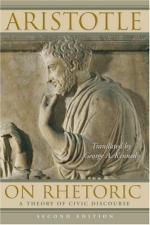|
This section contains 462 words (approx. 2 pages at 400 words per page) |

|
Book II, Chapters 23-26 Summary and Analysis
Chapter 23: There are twenty-eight general forms for enthymemes. The a fortiori argument, to give an example, proves something in a circumstance in which it is less likely to be true in order to show that it must be true in the circumstance in which it is more likely, or vice versa. Thus, for example, one might argue that a person is the kind of person who would hit his neighbor because he has already hit his father, a more serious act. One can also argue from definition. Thus, Socrates once proved the existence of God by pointing out that his audience already believed in the supernatural. The supernatural, he said, is either God himself or the works of God, and if one believes in the works of God, one must also believe in God. A...
(read more from the Book II, Chapters 23-26 Summary)
|
This section contains 462 words (approx. 2 pages at 400 words per page) |

|




